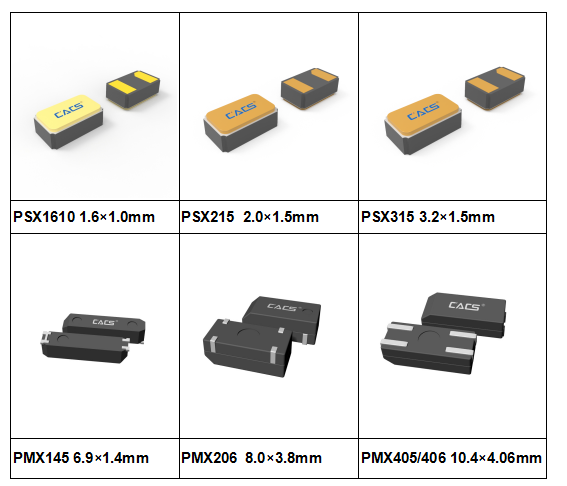What Are You Looking For?
等效串联电阻 (ESR) 是评估器件性能的关键参数。晶体振荡器, ESR值直接反映了谐振状态下的能量损耗程度。无论是kHz级音叉晶体还是MHz级AT切割晶体,ESR值都受多种因素影响。深入了解ESR、封装尺寸和工作频率之间的关系,对于优化电路设计和元器件选择至关重要。
ESR特征 千赫兹晶体单元
在千赫兹(kHz)频率范围内,晶体振荡器通常采用音叉晶体元件。由于其特殊的振动模式,千赫兹晶体通常具有相对较高的等效串联电阻(ESR)值。我们的产品数据显示,千赫兹晶体单元的封装尺寸与ESR值之间存在明显的关联性:
1.6×1.0mm封装:最大ESR为90 kΩ
2.0×1.5mm封装:最大ESR为70 kΩ
3.2×1.5mm封装:最大ESR为70 kΩ
6.9×1.4mm封装:最大ESR为65 kΩ
8.0×3.8mm封装:最大ESR为50 kΩ
10.4×4.06mm封装:最大ESR为50 kΩ
这些 ESR 特性使 kHz 晶体振荡器在低功耗应用中具有明显的优势,使其特别适合需要长电池寿命的物联网设备和便携式电子产品。

ESR分析 MHz晶体单元
MHz晶体振荡器采用AT切割厚度剪切振动模式,其ESR特性呈现更为复杂的规律。根据我们的技术分析,MHz晶体单元的ESR受其封装尺寸和工作频率的双重影响。
对于给定的封装尺寸,ESR通常会随着频率的增加而降低。这主要是因为高频晶体使用更薄的晶体坯料,从而降低了振动质量,并相对减少了能量损失。然而,具体的ESR值必须同时考虑特定频率点和封装尺寸才能确定。
我们的产品线涵盖从 1.6×1.2mm 到 7.0×5.0mm 的各种封装尺寸,每个封装都针对特定的频率范围和 ESR 要求进行了优化。
深入的技术原理分析
千赫兹晶体的机制:
音叉晶体的振幅相对较大。封装尺寸直接影响音叉臂的振动空间和空气阻尼效果。较大的封装尺寸能提供更充足的振动环境,减少机械约束,从而有助于降低等效串联电阻(ESR)。
MHz晶体的机理:
AT切割厚度剪切模式的ESR特性更为复杂。除了封装尺寸的影响外,工作频率也成为决定ESR值的关键因素。由于高频晶体具有更薄的晶体坯料和优化的电极设计,因此通常能实现更低的ESR值。这种频率与ESR之间的反比关系是兆赫兹晶体振荡器的一个关键特性。
专业应用选择指南
千赫兹晶体的选择策略:
超低功耗器件(例如智能手表、物联网传感器):优先选择 1.6×1.0mm 或 2.0×1.5mm 封装。
工业控制和汽车电子:建议采用 3.2×1.5mm 及更大的封装尺寸。
高精度定时模块:选择更大的封装尺寸,例如 8.0×3.8mm,以获得更好的稳定性。
MHz晶体的选择策略:
有必要详细了解特定频率点的 ESR 特性。
全面考虑封装尺寸与工作频率之间的关系。
根据应用场景的功耗和稳定性要求,选择合适的ESR范围。
技术发展趋势
随着电子产品向多功能化和小型化方向发展,晶体振荡器技术也在不断创新。在千赫兹(kHz)频段,我们正在开发更小的封装技术,以在保持低功耗特性的同时进一步缩小尺寸。在兆赫兹(MHz)频段,技术研发的重点在于支持更高的频率和更优的等效串联电阻(ESR)性能,同时保持更小的尺寸。
系统级封装(SiP)技术在两个频率范围内均展现出巨大的潜力。通过将振荡电路与晶体谐振器集成,可以优化整体ESR特性。我们致力于通过持续的技术创新,提供更精确的频率控制解决方案。
结论
晶体振荡器的ESR特性是由封装尺寸、工作频率和晶体坯料设计等因素共同决定的。对于kHz晶体,ESR主要受封装尺寸的影响;而对于MHz晶体,则必须同时考虑封装尺寸和工作频率之间的复杂相互作用。
正确理解ESR有助于工程师在项目开发过程中做出更准确的元件选型决策。我们建议仔细评估具体应用的需求,并根据工作频率和封装要求选择最合适的晶体振荡器产品。
想了解更多关于一晶科技产品的信息吗?
需要选型或技术咨询吗?
欢迎通过以下方式联系我们!
电话:0086-576-89808609
电子邮件:market@acrystals.com
网站:[www.acrystals.com](http://www.acrystals.com)
我们提供全面的技术支持,帮助客户根据具体的应用场景和性能要求选择最合适的晶体解决方案,确保最佳的系统性能和可靠性。